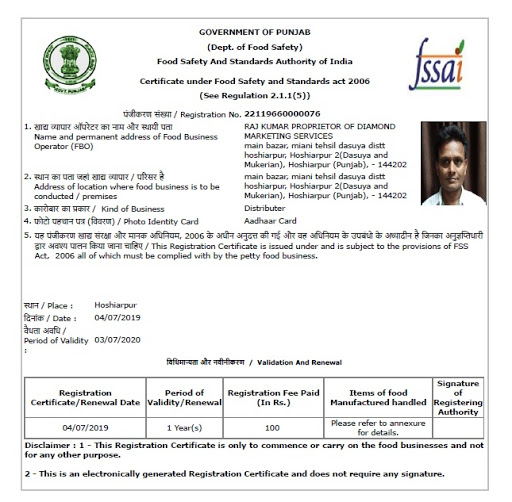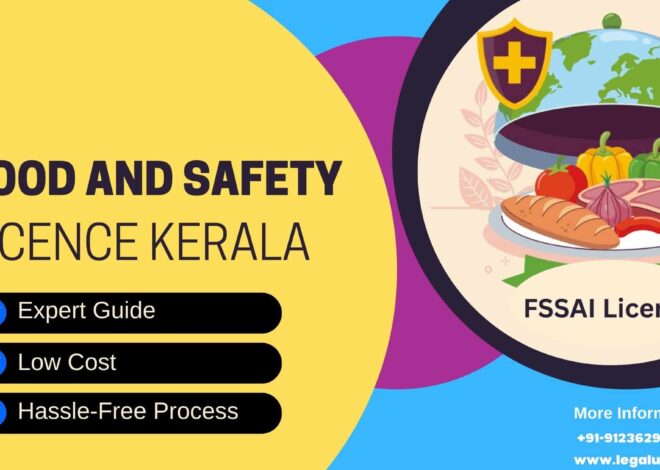
Quick process to File FSSAI Registration Online Apply
Table of Contents
ToggleProcess To File FSSAI Registration Online : Explained
In This Blog post you know everything about Food license or FSSAI Registration online and How you can easily Get or Register FSSAI license online .
What is FSSAI ?
FSSAI (Food Safety and Standards Authority of India) registration is a mandatory requirement for individuals or businesses involved in the manufacturing, processing, packaging, distribution, and sale of food products in India.
FSSAI is a government agency responsible for regulating and supervising food safety and standards in the country. FSSAI registration ensures that food products meet certain quality and safety standards to protect the health of consumers.
Why FSSAI License is Required
An FSSAI (Food Safety and Standards Authority of India) license is required to regulate and monitor the food industry, ensuring that food products meet established safety and quality standards. It serves several crucial purposes:
- Food Safety: FSSAI licenses enforce strict hygiene, safety, and quality standards in food production, processing, and distribution, reducing the risk of foodborne illnesses and contamination.
- Consumer Protection: It safeguards the health and interests of consumers by ensuring that the food they purchase is safe for consumption, properly labeled, and free from adulteration.
- Legal Compliance: FSSAI registration or licensing is a legal mandate for food businesses in India. Operating without it can lead to penalties, product recalls, and legal consequences.
- Quality Assurance: It promotes the production and sale of high-quality food products, enhancing consumer trust and facilitating fair competition in the food industry.
- International Trade: FSSAI certification is often necessary for exporting food products, ensuring compliance with international food safety standards and facilitating trade.
Who Needs a FSSAI License?
In India, the Food Safety and Standards Authority of India (FSSAI) issues licenses to regulate and ensure the safety and quality of food products.
The type of FSSAI license required depends on the nature and scale of the food business. Here’s an overview of who needs an FSSAI license:
Basic FSSAI Registration: Small-scale food businesses, including petty retailers, small food manufacturers, and food businesses with annual turnover below a certain threshold, need to obtain a basic FSSAI registration. The specific threshold varies by state.
State FSSAI License: Medium-sized food businesses operating within a single state must obtain a state FSSAI license. This includes businesses with annual turnover above the basic registration threshold but below a specified limit.
Central FSSAI License: Large-scale food businesses that operate in multiple states or have an annual turnover exceeding a prescribed limit must obtain a central FSSAI license.
Importers: Any entity importing food products into India, whether it’s a large importer or an individual importing food for personal consumption, must obtain an FSSAI license for the specific import activity.
Exporters: Export-oriented food businesses, including those that export food products to other countries, should also acquire an FSSAI license to demonstrate compliance with safety and quality standards.
Food Manufacturers: Any food manufacturing facility, regardless of size, needs an FSSAI license to produce and sell food products in India.
Food Distributors and Wholesalers: Distributors, wholesalers, and businesses involved in the supply chain of food products need to have an FSSAI license to ensure the distribution of safe and compliant food items.
Caterers: Catering services and food preparation businesses must obtain an FSSAI license to serve food at events, parties, and other occasions.
Restaurants and Eateries: Restaurants, cafes, foodservice establishments, and food outlets require an FSSAI license to operate and serve food.
Food Retailers: Supermarkets, grocery stores, and food vendors selling food products to the public need to obtain an FSSAI license to ensure the sale of safe and compliant food.
FSSAI Registration Online - Get License Fast
Book NowFSSAI Registration Online Process
FSSAI registration online process Detailed Answer
- Document Preparation:
Before initiating the FSSAI registration process, gather and prepare the necessary documents. These typically include identity and address proof, photographs, food safety management plan, and other business-related documents. - Visit the FSSAI Website:
Start by visiting the official FSSAI website (https://www.fssai.gov.in/). This is the authoritative source for all FSSAI-related information and applications.
- Create an Account:
Register yourself or your business as a food business operator (FBO) by creating an account on the FSSAI portal. Provide your name, email address, mobile number, and set a strong password. - Log In to Your Account:
Once your account is created, log in using your registered email and password to access the FSSAI portal. - Select the Type of Registration:
Determine the appropriate category of registration based on the scale of your food business. This can be Basic, State, or Central Registration. - Fill in the Application Form:
Complete the online application form with accurate details. You’ll be asked for information about your business, such as its name, address, type, and contact details. Specify the types of food products you intend to manufacture, distribute, or sell. - Upload Documents:
Upload the required documents as specified in the application form. Ensure that you follow the guidelines for document formats and sizes. - Fee Payment:
Pay the applicable registration fee based on your business type and the duration (1 year, 5 years, or 10 years). Multiple online payment options are available for your convenience. - Application Submission:
Double-check all the information provided in the application. Once satisfied, click the “Submit” or “Proceed” button to submit your application. - Application Processing:
Your application will undergo verification by the FSSAI authorities. They will assess the provided information and documents for compliance with food safety standards. - Approval and Certificate Issuance:
Upon successful verification, you will receive an FSSAI registration or license certificate. This certificate will include a unique FSSAI registration/license number that must be displayed on your food product labels. - Compliance and Renewal:
After obtaining the FSSAI registration, ensure continued compliance with food safety regulations. Renew your FSSAI certificate as required, typically every 1, 5, or 10 years, depending on your registration category.
Documents Required for FSSAI registration
The documents required for FSSAI (Food Safety and Standards Authority of India) registration may vary depending on the category of registration (Basic, State, or Central) and the nature of your food business. However, here is a general list of common documents typically needed for FSSAI registration:
-
Form-B: The completed and signed Form-B, which is the application form for FSSAI registration.
-
Identity Proof of the Applicant/Partner/Director:
- Aadhar Card
- Voter ID
- Passport
- Driver’s License
- PAN Card
-
Passport-Sized Photograph: Recent passport-sized photographs of the applicant or authorized signatory.
-
Address Proof of the Business Premises:
- Rental Agreement or Sale Deed (if owned)
- Utility Bill (Electricity, Water, Gas, etc.) with the address
- NOC (No Objection Certificate) from the landlord (if applicable)
-
Business Entity Proof:
- For Proprietorship: Self-declaration or Gumasta License
- For Partnership: Partnership Deed
- For Company: Certificate of Incorporation
-
List of Food Products: A list of the food products that you intend to manufacture or sell under your FSSAI registration.
-
Food Safety Management Plan: An outline of the food safety management system implemented in your business. This includes details about food safety practices, quality control measures, and compliance with FSSAI regulations.
-
Board Resolution (for Companies): If you are a company, you may need to provide a board resolution authorizing the application for FSSAI registration.
-
Additional Documents (as applicable):
- NOC from the manufacturer (if you are a distributor or marketer)
- Certificate of Analysis for proprietary food
- NOC from the municipality or local body
- Supporting documents for turnover (for State and Central licenses)
- Importer Exporter Code (IEC) for businesses involved in import/export
- Proof of turnover and transportation turnover (for Central licenses)
FSSAI Certificate Sample

FSSAI Registration fees
The FSSAI (Food Safety and Standards Authority of India) registration fees depend on the category of registration and the duration for which you want to obtain the FSSAI license. The three main categories of FSSAI registration are Basic, State, and Central. Here are the typical registration fees for each category:
-
Basic Registration:
- For small-scale food businesses with an annual turnover of up to Rs. 12 lakhs.
- The registration fee is minimal and often ranges from Rs. 100 to Rs. 500 for a single year.
-
State Registration:
- Applicable to medium-sized food businesses with an annual turnover between Rs. 12 lakhs and Rs. 20 crores.
- The registration fee varies from state to state but is generally in the range of Rs. 2,000 to Rs. 5,000 for a single year.
-
Central Registration:
- Required for large-scale food businesses with an annual turnover exceeding Rs. 20 crores.
- The registration fee also varies depending on the specific nature and scale of the business but is generally higher than State Registration fees .The Registration fees for central license is Rs. 7500 for a single year.
Conclusion
In conclusion, FSSAI registration is a critical requirement for food business operators in India. It ensures food safety, quality, and legal compliance in the food industry.
Obtaining an FSSAI certificate not only protects consumer health but also builds trust, facilitates business growth, and enables participation in international trade.
Our experts at Legalution will help you in the comprehensive filing and combat annual compliance for your Food License (FSSAI) without any hassle.
You may also like :





